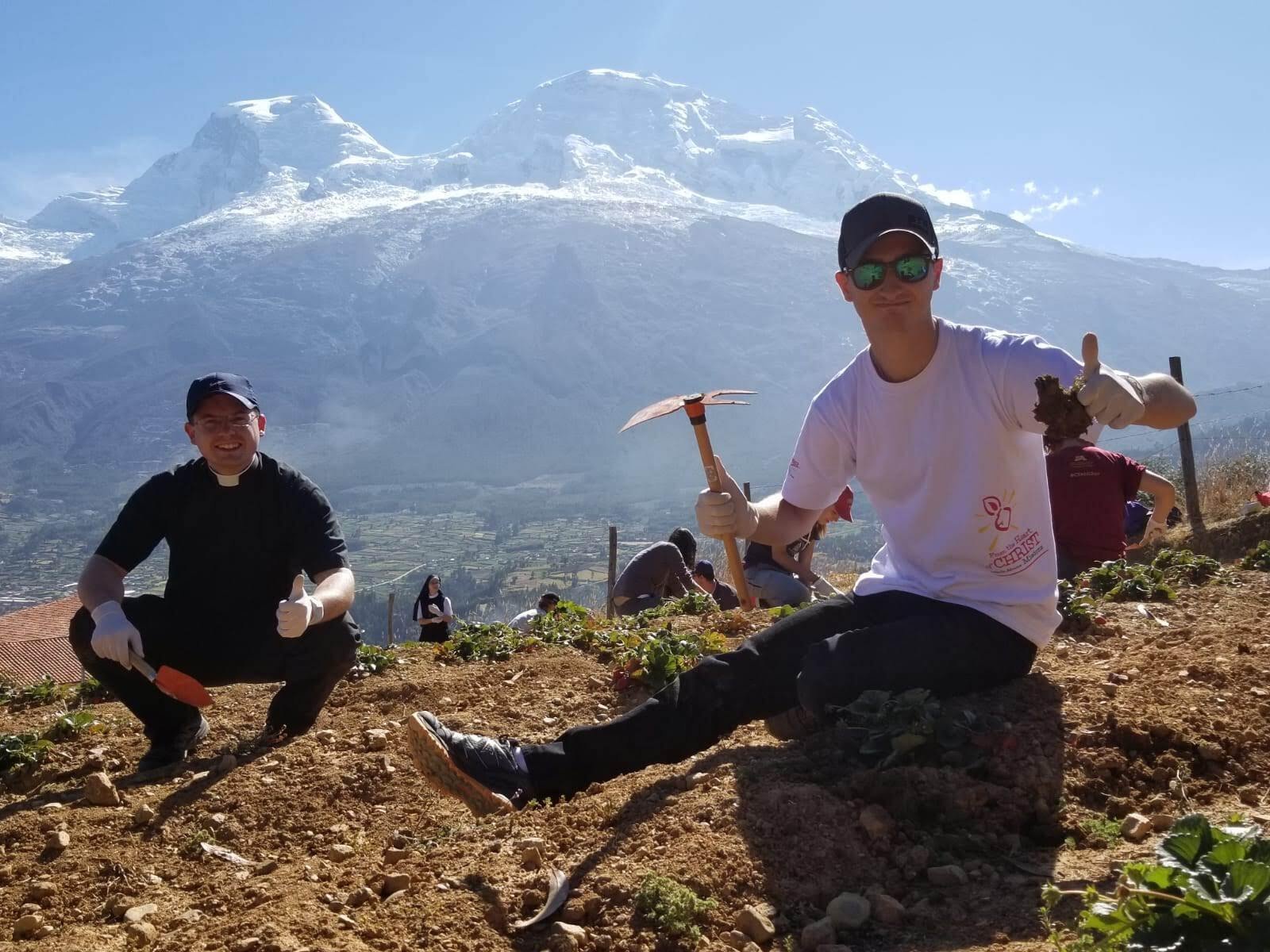‘The Holy Spirit is calling us to evangelize,’ says St. Clair Shores priest who served in Peru in reaction to Pope Leo’s election
ST. CLAIR SHORES — Fr. Joe Barron, PES, grew up in the Midwest, was sent to Peru as a missionary and now serves at St. Isaac Jogues Parish in St. Clair Shores.
So when the Pro Ecclesia Sancta priest found out Cardinal Robert F. Prevost, the Chicago-born Augustinian missionary who was previously bishop of Chiclayo, Peru, had been elected as Pope Leo XIV, he saw lot of himself in the pontiff when he first appeared on the balcony overlooking St. Peter’s Square.
“It felt like he was directly speaking to me, because I’m from the Midwest as well and I spent a lot of time in Peru,” Fr. Barron told Detroit Catholic. “It’s just a beautiful gift from God to have him as our leader.”
Fr. Barron grew up in Minneapolis and joined Pro Ecclesia Sancta in 2012 and was sent as a missionary to Lima, Peru, in 2013.
Pro Ecclesia Sancta, “For the Holy Church” in Latin, was founded in Lima in 1981 by Fr. Pablo Meno, SJ. Since then, it has grown into an order that includes religious men and women as well as a lay community, ministering in Peru, Ecuador, Uruguay, Spain and the United States.
Fr. Barron served in Lima, the Peruvian capital, while Pope Leo XIV was bishop in Chiclayo, a 12-hour drive from Lima to the country’s north. Chiclayo is considered to be on the periphery and does not typically have a cardinal as its bishop, Fr. Barron explained.

“We were ministering in Lima, the capital, but we took a couple of trips up to Chiclayo to do some mission work as well,” Fr. Barron said. “(Pope Leo XIV) was considered to have the heart of a missionary. People thought of him as a bishop who really listens to the clergy, the religious, the laypeople, and tries to figure out solutions. From what I have heard from our members who have worked closely with him, he just has that kind of missionary spirit he brings to the table.”
Fr. Barron said Chiclayo is considered the “Windy City” of Peru, an appropriate tie-in to the pope’s Chicago roots.
“The fact that the pope, in his first greetings, said a greeting to Chiclayo — it’s like the pope saying greetings to Petoskey or some town way out of the way,” Fr. Barron explained. “He’s going to be a great uniter, I think. He speaks to the reality of the Church in South America, but he’s a North American, and he also has experience from the Vatican. So he will be a pope who understands and has his feet in every corner of the Church.”
Fr. Barron isn’t the only Peruvian connection in the Archdiocese of Detroit.
For the past 15 years, a cohort of 12 or so students from Brother Rice High School in Bloomfield Hills have gone down to Lima to visit fellow Christian Brothers School Colegio Fe Y Alegria and do mission work about the city.
“When we go down there, we do things like build a house,” said Thane Hall, director of campus ministry at Brother Rice. “It’s a rudimentary house our contractor has designed for us, and we go down and construct some walls and assemble parts of the house. It usually involves carrying pieces up the side of the mountain, putting a nice metal roof and pouring a cement floor. It provides people in need a chance to get out of the mist and the cold and lasts up to 10 years or more.”

Hall has had the chance to go down every year with the Brother Rice students, apart from 2020 because of COVID-19, when the students did a virtual immersion with their Edmund Rice Christian Brother colleagues in Peru instead.
He said the Peruvian people are welcoming to outsiders, part of the reason Pope Leo XIV garnered a great deal of popularity and respect in Chiclayo.
“The Peruvian people are such a joy and blessing; you can see the face of God in each of the Peruvian people,” Hall said. “It doesn’t matter where they come from, how much money they have, what they do for a living, if they’re rich or poor. You can see the joy of Christ in their face, and it’s just a warm, welcoming face.
“When our boys go down there, they are welcomed by the people and are brought into their homes to eat,” Hall added. “The Church there is so warm and down to earth; it meets the people where they are, and in their poverty, there is such joy with them.”

The Church is still learning about Pope Leo XIV following his inauguration Mass, deciphering from his first actions what his preferences and priorities might be for his pontificate. Hall said there is no doubt Pope Leo’s time in Chiclayo will have an impact.
“The people in Peru have a deep devotion to Mary, and I think you’ll see Pope Leo XIV has that same deep devotion to Mary as well,” Hall said. “When you go to Peru, most Peruvians will have in their homes some statue or painting of the Blessed Virgin, and she will be in a place of prominence in their home altars, along with Christ.
“The Peruvians also are big on popular piety, with religious festivals in town squares and processions filled with such beauty and joy in the practice of their faith, so I expect this pope will encourage those,” Hall added.
Fr. Barron said the pope’s missionary background encourages priests like him to engage the world.
“I’m hopeful he will encourage us missionaries and us younger priests and really all of us who are in leadership in the Church to have an even great faithfulness to our vocations to go out and preach the Lord’s will to the world,” Fr. Barron said. “I think he’s going to be a good source of unity, and given his motto, ‘In Illo uno unam,’ — ‘In the One, we are one’ — and given the name he chose and his background, he will be someone, I think, who can speak to everybody."
Hall also pointed to Pope Leo’s name selection as a sign of what the faithful can expect, particularly when it comes to caring for the people near the bottom of society and reinvigorating the faith in areas where it has become lukewarm.

“I think he will bring a spark to people all over the world, especially here in North America, where a lot of people, I think, take their faith for granted," Hall said. “Hopefully, with this pope’s missionary zeal, he’ll open up people’s hearts to see Christ in the poor, to do more outreach. Whether it’s around the world or here in the Archdiocese of Detroit, we’ll see people transcending whatever divisions we have in our society, whether it’s politics, class or race, and reach out to each other and bring Christ to others.”
Fr. Barron said having an American pope can bring about a “JPII” movement in the Church that will inspire young people to pursue their vocations and revive their identities as children of God.
In his homily this past week, Fr. Barron noted that more people are interested in the Catholic Church because of the recent news, and it is incumbent on all Catholics to use this moment in history to preach the good news.
“There are people asking questions right now,” Fr. Barron said. “We need to strike while the iron is hot, if you will. In our culture right now, everyone’s talking about the pope, so it’s a great opportunity to evangelize. This moment brings an awareness of God in our lives, both here in the States and in Peru. This is a moment the Holy Spirit is calling us to evangelize.”
Copy Permalink
papal transition












